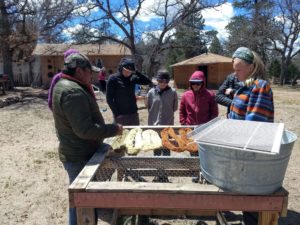
In the words of the great Bucky Preston (Hopi elder and activist), “I guess I’m an environmentalist.” What was meant by this seemingly simple statement was that through the actions and protests he has partaken in over his lifetime he was not trying to conform to a group identity, he was trying to live a life of intentionality where his actions aligned with his religious beliefs and values. While this all seems rather logical, it can be quite a complex task to fully evaluate and understand one’s intentions. It requires questioning your values and being deliberate with your words and actions. And since we live in a world where everything is political and we have a responsibility to stand up for things we believe in, reflecting on our intentions in this way is a critical component of being an active member of our communities.
How often do we truly reflect on our values? Do we ever question how those values developed and where our preconceived notions came from? Do we stop to think about why others might hold different belief systems and from where they originated? It is incredibly challenging to stop and reflect in this way when we live in a society that values constant action and movement. To admit you’re wrong or don’t know something is looked down upon, especially when our dominant communication style for hearing different views is debate, where there is a correct answer or a wrong side to be on. But talking with people from Hopi and Navajo Nation has made me realize that if I want to act, I should at least understand my desire for action. What compels me to move forward, what drives me, why do I care?
Once this intentional understanding of beliefs is realized, it seems to become much easier to be deliberate in how one acts and communicates with the rest of the world. Even the act of dyeing wool can become a practice of intention. One must gather herbal ingredients for the dye baths; not too much, it’s important to make sure some are left for future projects, but not too little or the color will be weak. One must gently wash the wool so it’s clean but doesn’t break. Then card it and spin it. Even rolling the finished project; if you roll it towards yourself you’ll bring all the strength and goodness of the animal and the herbs into yourself. Even the smallest actions, if done intentionally, can have a profound impact.
Darrell Marks, father and Navajo activist, explained to us the power of our voices and how we send intentions into the universe with our words. It is important to be careful and deliberate in how we speak to others and ourselves. We should know the meaning of our words and never underestimate their power. Communication is an essential element to activism. What message are we trying to convey? Who are we trying to convince? Who is delivering the message? Are voices missing from this conversation? Are we speaking over people that are on the frontline of this issue? This is of particular concern for Indigenous rights and voices within the environmental movement. The role of outsiders is to provide assistance if it is asked for; it’s never to speak for tribes’ concerns and issues.
Actions must be deliberate and sustained in order to make a difference, but should ideally also match our values as activists. That’s why continued learning and questioning is of the utmost importance.
Thank you front-country for all the stories and the reminder to practice intentionality.